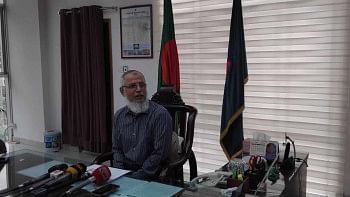Window of opportunity
Bhutan lies to the north of Bangladesh and is separated by 30 km of Indian territory.
It was the second country to recognise Bangladesh. In early 1973, formal diplomatic ties between the two countries were established.
In January 1980, Bangladesh opened its diplomatic mission in Bhutan, which was headed by a resident ambassador. Likewise, Bhutan reciprocated the diplomatic gesture by appointing an ambassador to Bangladesh in the same year.
As early as April 1972, both countries had expressed their desire to establish close relations. The first official commercial contact between Bhutan and Bangladesh began in late '70s, and in 1978 a Bangladesh trade delegation paid a visit to Bhutan to discuss the prospect of trade between the two countries. A Trade Agreement was concluded in September, 1980.
The four-day visit to Bangladesh of Bhutan's Prime Minister Lyonchen Jigme Yoser Thinley is significant in many ways. It has reiterated the bonds of friends and cooperation to meet the challenges of the 21st century.
Furthermore, it underscores that the two countries can embark on collaboration in new areas, besides both countries can make this part of South Asia into an economic hub of activities through regional interconnectivity and hydropower cooperation.
The Bhutanese premier led a 20-member delegation, including the health minister, cabinet secretary and foreign secretary. Six members of Bhutan Chamber of Commerce and Industry accompanied Thinley.
It is noted that Prime Minister Sheikh Hasina visited Bhutan in November 2009, which was her first to any Saarc country after her assumption of office as the head of the government, reflecting the importance Bangladesh has always attached to relations with Bhutan.
On January 11, Thinley addressed a seminar on "Gross National Happiness" at Dhaka University. He explained the country's adherence to the concept of gross national happiness (GNH) as a priority rather than judging the success of the state by the use of Western economic metrics.
Based on Buddhist principles, the Bhutanese version of GNH emphasises "a set of social and economic interventions that evaluate social change in terms of the collective happiness of people."
The GNH concept is now firmly entrenched in Bhutan's national policies, with four main objectives -- investing in people, living in harmony with tradition and nature, effective and good governance; and developing a dynamic economy -- as the foundations for a vibrant democracy.
The Bhutanese prime minister visited the Sundarbans, the largest mangrove forests in the world, as well as Chittagong and Cox's Bazar. He also visited a Buddhist temple in Cox's Bazar. The people of Bangladesh deeply appreciated the Bhutanese prime minister's vote for the Sundarbans to be included one of the modern Seven Wonders of the World.
During the Bhutanese prime minister's visit, two agreements were signed -- an agreement on cultural exchange and a Memorandum of Understanding on cooperation in the health sector.
Under the cultural agreement, including development of tourism, the two countries can work together to have a package trip for international visitors to visit Bhutan and Bangladesh. The hills and pristine greenery of Bhutan and the mangrove forests of the Sundarbans in Bangladesh and the beaches embracing the Bay of Bengal could attract tourists to see both sides of natural beauty.
In terms of the health care agreement, Bhutan plans to recruit about 30 doctors -- both specialists and general with five years experience -- on yearly basis for the next three years.
Prime Minister Thinley reiterated that his country would extend cooperation to meet the power deficit of Bangladesh (Bhutan has the potential to produce 30,000MW, which it has initiated to develop its potential).
Thinley said that Bhutan could take advantage of Bangladesh's human sources -- professionals, skilled and semi-skilled people -- to develop its infrastructure, industries and information technology.
The Bangladesh prime minister said that connectivity between Bangladesh, Bhutan, India, Nepal, North Eastern India, Myanmar, China and Thailand to South East Asia holds immense opportunities in economic and trade areas.
The prime minister also said that a separate exercise was also underway to bring all issues related to transit and connectivity within a single framework to present a clear picture of opportunities.
Thinley thanked the Bangladesh government for the offer to use Chittagong and Mongla ports. The use of the ports would yield huge savings for Bhutan and it is reported that India agreed that Bhutan could use its territory for transit to Bangladesh.
On trade, the two countries have enormous opportunities and the bilateral trade could be raised to $100 million from the current figure of $30 million.
Bangladesh imports from Bhutan include boulders, dolomite, gypsum, dust coal, slate, graphite, timber and fruit products (jelly and jam), and exports to Bhutan include consumer goods, pharmaceuticals, jute products, newsprint, chemicals, detergents and light machinery.
Bhutan's Seed Corporation signed an agreement in February 2000 with Brac in Bangladesh to supply onion and radish seeds.
Both nations are members of Saarc and are keen to develop the regional forum into a dynamic and vibrant one. Both countries are Least-Developed Countries and have a common approach to economic related policies in the multinational forums. Both joined the Non-Aligned Movement in 1973. Both are parties to the 1970 Nuclear Non-Proliferation Treaty.
Bhutan Airlines operate between the two countries and people-to-people contact has increased considerably.
Bangladesh and Bhutan can complement as well as supplement each other's development efforts with diverse resources and potentials to inject further dynamism in many thrust sectors. Exchange of fresh ideas and common aspirations coupled with conclusion of agreements characterised the visit of the Bhutanese prime minister, who is also the Saarc Chairman.

 For all latest news, follow The Daily Star's Google News channel.
For all latest news, follow The Daily Star's Google News channel. 



Comments